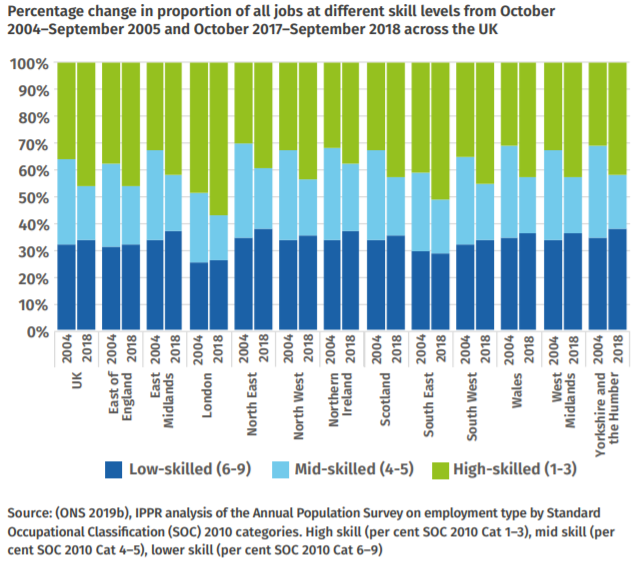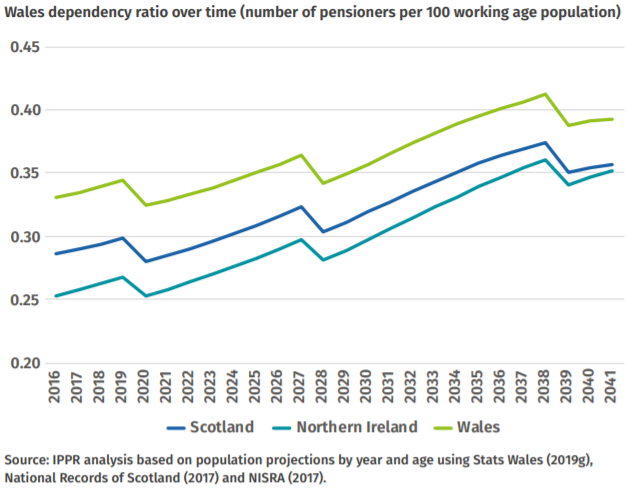REGIONAL ANALYSIS: Wales
Article
This analysis of the Welsh economy was handed out at our event Economic Justice for Wales. The event was part of a UK-wide series of public meetings held by the IPPR Centre for Economic Justice.
English
A Changing Labour Market – Like much of the UK, Wales has seen a considerable reduction in the proportion of jobs which are ‘mid-skilled’ (skilled trades and administrative and secretarial roles) since 2004. However, in Wales the difference has been almost entirely made up by a growth in high-skilled work, jobs that typically require advanced education, training and work experience - with the greatest increase seen of any region or nation in the UK in the last 14 years from 35% of jobs in 2004 to 42% in 2018.

The increase in the number of high-skilled job roles is welcome, and an indicator of success over the last 14 years in Wales. However, the reduction in mid-skilled work could pose a challenge to career progression for people attempting to move out of low-skilled work.
Productivity Challenges Ahead – IPPR analysis finds that the working age population in Wales is expected to shrink compared to the number of pensioners, and that this is and will continue to be more pronounced thadsdt the other devolved nations of the UK.

In 2016, there were 33 pensioners for every 100 working age people, but by 2041 there will be 39 pensioners, even when accounting for expected increases in the State Pension Age.
For the Welsh economy to keep up with a shrinking workforce, Wales will need to grow its productivity, the amount of goods and services that can be produced per worker per hour: addressing gaps in worker’s education and skills, improving processes by which goods and services are made and moving the Welsh economy towards more high-value sectors, such as science and technology.
Innovation– Wales has the smallest concentration of spending on research and development (R&D) of any nation or region in the UK. In 2017 this was estimated to be just £387 per working age person compared to £724 in Scotland or £1,571 in the East of England, over four times higher.
Government investment in science and technology in Wales has also been low, estimated at £41 per person per year in Wales in the past 5 years compared to the UK average of £54.
Cymraeg
Marchnad Lafur Sy’n Newid - Fel llawer o'r DU, mae Cymru wedi gweld gostyngiad sylweddol yn y gyfran o swyddi sy'n 'ganol-fedrus' (crefftau medrus a rolau gweinyddol ac ysgrifenyddol) ers 2004. Fodd bynnag, yng Nghymru, mae'r gwahaniaeth wedi cael ei wneud i fyny bron yn gyfan gwbl gan dwf mewn gwaith dra medrus, swyddi sydd fel arfer yn gofyn am addysg uwch, hyfforddiant a phrofiad gwaith - gyda'r cynnydd mwyaf a welwyd o unrhyw ranbarth neu wlad yn y Deyrnas Unedig yn y 14 mlynedd diwethaf o 35% o swyddi yn 2004 i 42% yn 2018.
Croesewir y cynnydd yn y nifer o rolau swyddi tra medrus, sy’n arwydd o lwyddiant dros y 14 mlynedd diwethaf yng Nghymru. Fodd bynnag, gallai'r lleihad mewn gwaith ganol fedrus osod her i ddilyniant gyrfa i bobl sy’n ceisio symud allan o waith sgiliau isel.
Heriau Cynhyrchiant o’n blaen - Mae dadansoddiad IPPR yn canfod bod disgwyl i boblogaeth o oedran gweithio yng Nghymru leihau o gymharu â nifer y pensiynwyr, a bydd hyn yn parhau i ddod yn fwy amlwg i wledydd datganoledig eraill y DU.
Yn 2016, roedd x o bensiynwyr ar gyfer pob 100 o bobl oedran gweithio, ond erbyn 2041 bydd y o bensiynwyr, hyd yn oed pan yn cyfrifo cynnydd disgwyliedig yn yr Oedran Pensiwn y Wladwriaeth.
Er mwyn i economi Cymru gadw i fyny gyda gweithlu sy'n lleihau, bydd angen i Gymru gynyddu ei gynhyrchiant, bydd nifer o nwyddau a gwasanaethau y gellir ei gynhyrchu fesul gweithiwr yr awr: mynd i'r afael â bylchau mewn addysg a sgiliau gweithiwr, gwella prosesau a ddefnyddir wneud i nwyddau a gwasanaethau a symud economi Cymru tuag at fwy o sectorau gwerth uchel, megis gwyddoniaeth a thechnoleg.
Arloesi- Cymru sydd gan y crynodiad lleiaf o wariant ar ymchwil a datblygu (R & D) o unrhyw genedl neu ranbarth yn y DU. Yn 2017 amcangyfrifwyd mai dim ond £387 bob person oedran gweithio o'i gymharu â £724 yn yr Alban neu £1,571 yn Nwyrain Lloegr, dros bedair gwaith yn uwch.
Mae buddsoddiad y Llywodraeth mewn gwyddoniaeth a thechnoleg yng Nghymru hefyd wedi bod yn isel, a amcangyfrifir i fod yn £41 y pen y flwyddyn yng Nghymru yn ystod y 5 mlynedd diwethaf o'i gymharu â chyfartaledd y DU sef £54.
Related items

The full-speed economy: Does running a hotter economy benefit workers?
How a slightly hotter economy might be able to boost future growth.
Making the most of it: Unitarisation, hyperlocal democratic renewal and community empowerment
Local government reorganisation need not result in a weakening of democracy at the local level.
Transport and growth: Reforming transport investment for place-based growth
The ability to deliver transformative public transport is not constrained by a lack of ideas, public support or local ambition. It is constrained by the way decisions are taken at the national level.